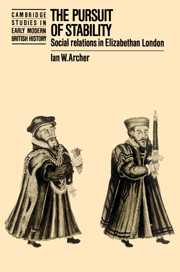Book contents
- Frontmatter
- Contents
- List of figures
- List of tables
- Acknowledgements
- List of abbreviations
- 1 INTRODUCTION: THE PROBLEM OF ORDER
- 2 THE FRAMEWORK OF SOCIAL RELATIONS: THE CITY ELITE
- 3 THE FRAMEWORK OF SOCIAL RELATIONS: LOCAL GOVERNMENT, NEIGHBOURHOOD, AND COMMUNITY
- 4 THE FRAMEWORK OF SOCIAL RELATIONS: THE LIVERY COMPANIES
- 5 SOCIAL POLICY
- 6 CRIME AND SOCIETY
- 7 CONCLUSION
- Bibliography
- Index
- Cambridge Studies in Early Modern British History
2 - THE FRAMEWORK OF SOCIAL RELATIONS: THE CITY ELITE
Published online by Cambridge University Press: 20 October 2009
- Frontmatter
- Contents
- List of figures
- List of tables
- Acknowledgements
- List of abbreviations
- 1 INTRODUCTION: THE PROBLEM OF ORDER
- 2 THE FRAMEWORK OF SOCIAL RELATIONS: THE CITY ELITE
- 3 THE FRAMEWORK OF SOCIAL RELATIONS: LOCAL GOVERNMENT, NEIGHBOURHOOD, AND COMMUNITY
- 4 THE FRAMEWORK OF SOCIAL RELATIONS: THE LIVERY COMPANIES
- 5 SOCIAL POLICY
- 6 CRIME AND SOCIETY
- 7 CONCLUSION
- Bibliography
- Index
- Cambridge Studies in Early Modern British History
Summary
THE STABILITY OF THE CITY IN HISTORICAL PERSPECTIVE
The government of the corporation of London was formally oligarchic. Executive authority lay with the court of aldermen, consisting of twenty-six men, one for each of the City's wards, and holding office for life. Apart from responsibility for much of the routine of City administration, the aldermen disposed of considerable judicial authority, managing the estates of minors in their capacity as the City's court of orphans, presiding over the mayor's court, the court of hustings, the sheriffs' court, and, in conjunction with representatives of common council, over the court of conscience with jurisdiction over petty debts. The senior aldermen, those who had passed the chair, together with the recorder, constituted the commission of peace in the City, and sat on gaol deliveries and at City sessions. The aldermen were able to exercise control over recruitment into their own ranks because, although vacancies were filled from among nominations from the wards, the court had the right to reject nominees. The high cost of office-holding, which resulted from the aldermen's duty of subsidising the round of civic feasting, meant that it was the preserve of the wealthy. In 1582, twenty-four of the aldermen were recruited from among the seventy-five householders assessed to the subsidy of that year at over £200. In the early Elizabethan period almost all the aldermen belonged to the cloth-exporting Merchant Adventurers' Company.
- Type
- Chapter
- Information
- The Pursuit of StabilitySocial Relations in Elizabethan London, pp. 18 - 57Publisher: Cambridge University PressPrint publication year: 1991



